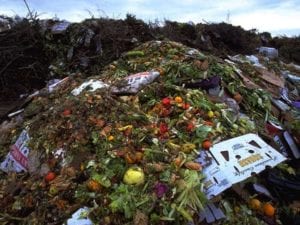
Food waste also comes with its own environmental concerns. Organic waste in landfills is particularly problematic because it leads to the production of methane gas and leachate which contaminates ground water and contributes to climate change.
One way of dealing with this problem and forcing consumers to take responsibility for the waste they generate is by making it illegal to place food waste in landfills. This is in the process of becoming a reality in Britain.
BigGreen.co.uk says that there are long-running campaigns to encourage households to reduce their waste responsible purchasing and composting food waste. However, large quantities of food waste is still ending up in landfills. According to BigGreen.co.uk , the biggest culprits when it comes to food waste are:
- food processing industry
- waste from supermarkets and shops
- restaurants
- hospitals
- schools
- prisons and other institutions
- workplace cafeterias and canteens.
Such legislation has already taken effect in places such as California. The State’s Assembly Bill 1826 requires all commercial generators of food waste to have it composted or transformed to energy through anaerobic digestion.
In California, the effort and frustration faced by consumers dealing with their own waste is countered. This is because all companies and organisations have to do is to make an arrangement with their current waste management company to collect organic waste separately. Most of these companies will even provide appropriate receptacles free-of-charge, and collect them frequently enough so that food waste is not left on the premises any longer than is necessary. Ultimately, it’s down to waste companies to adapt their practices to enable greener collections.
Combating organic waste in landfills requires a mind-set change. The benefits of reusing organic waste for compost or energy production are more sensible solutions than needless wasting. While people may initially be resistant to change at first, enforcing recycling through legislation could be an important step in the correct direction.